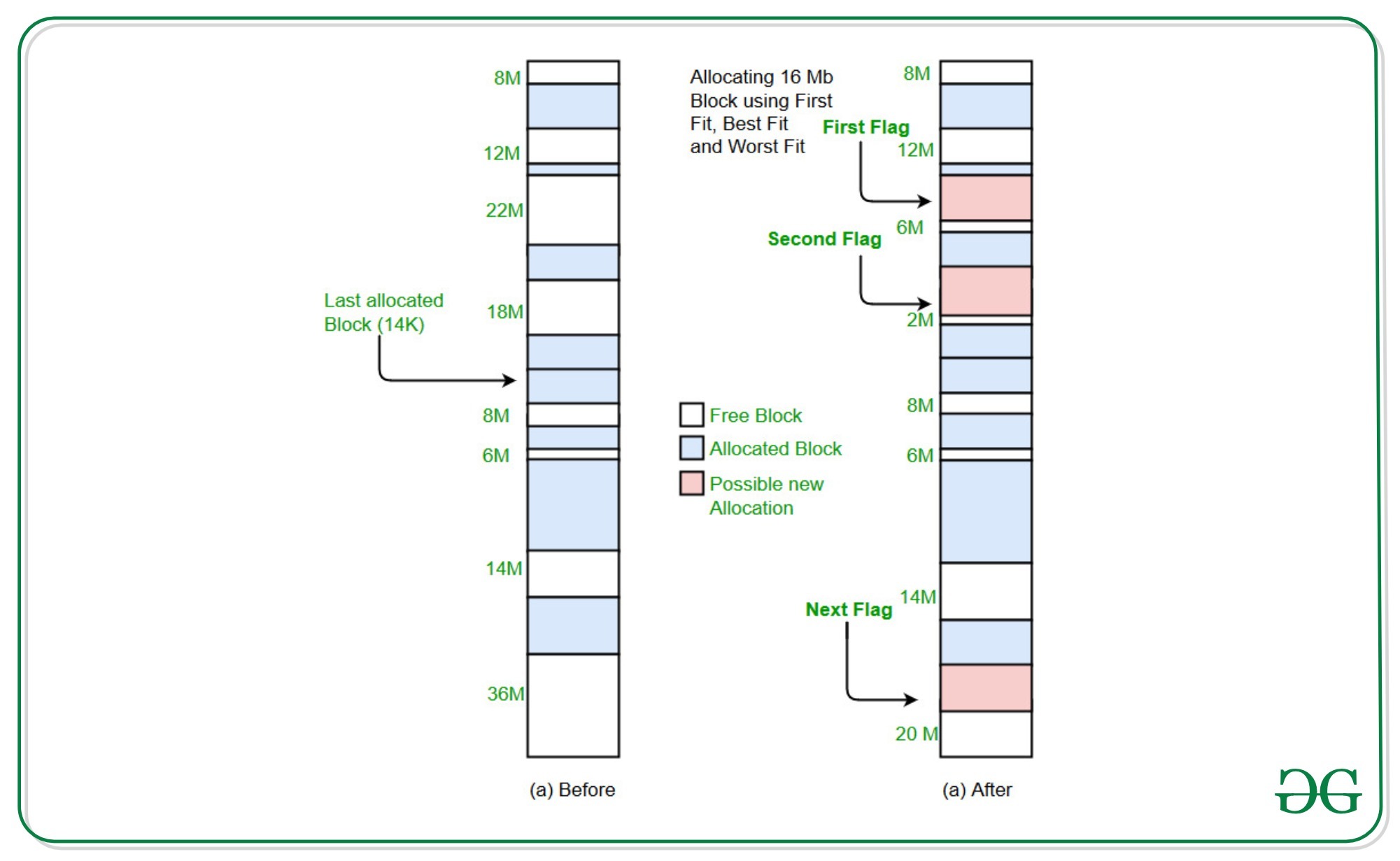内存管理的最佳拟合算法:进程分配损失最小的内存分区是分配给进程的最佳内存分区。
我们已经在本文中讨论了一种使用数组的最佳拟合算法。但是,在这里我们将研究使用链表的另一种方法,其中也可以删除已分配的节点。
例子:
Input : blockSize[] = {100, 500, 200}
processSize[] = {95, 417, 112, 426}
Output :
Block with size 426 can't be allocated
Tag Block ID Size
0 0 95
1 1 417
2 2 112
After deleting node with tag id 1.
Tag Block ID Size
0 0 95
2 2 112
3 1 426

方法:想法是为每个内存块分配一个唯一的标签 id。每个不同大小的进程都被赋予了块 id,这表示它们属于哪个内存块,以及唯一的标签 id,用于删除特定进程以释放空间。创建给定内存块大小的空闲列表和已分配的进程列表。
创建分配列表:
通过查找最合适或最佳的内存块来分配内存,创建给定进程大小的已分配列表。如果未找到内存块,则只需打印它。否则,创建一个节点并将其添加到分配的链表中。
删除过程:
每个进程都有一个唯一的标签 ID。从分配的链表中删除进程节点,为其他进程释放一些空间。删除后,使用被删除节点的block id增加空闲链表中的内存块大小。
下面是该方法的实现:
C++
// C++ implementation of program
// for best fit algorithm for memory
// management using linked list
#include
using namespace std;
// Two global counters
int g = 0, k = 0;
// Structure for free list
struct free {
int tag;
int size;
struct free* next;
}* free_head = NULL, *prev_free = NULL;
// Structure for allocated list
struct alloc {
int block_id;
int tag;
int size;
struct alloc* next;
}* alloc_head = NULL, *prev_alloc = NULL;
// Function to create free
// list with given sizes
void create_free(int c)
{
struct free* p = (struct free*)
malloc(sizeof(struct free));
p->size = c;
p->tag = g;
p->next = NULL;
if (free_head == NULL)
free_head = p;
else
prev_free->next = p;
prev_free = p;
g++;
}
// Fuction to print free list which
// prints free blocks of given sizes
void print_free()
{
struct free* p = free_head;
cout << "Tag\tSize\n";
while (p != NULL) {
cout << p->tag << "\t"
<< p->size << "\n";
p = p->next;
}
}
// Function to print allocated list which
// prints allocated blocks and their block ids
void print_alloc()
{
struct alloc* p = alloc_head;
cout << "Tag\tBlock ID\tSize\n";
while (p != NULL) {
cout << p->tag << "\t " << p->block_id
<< "\t\t" << p->size << "\n";
p = p->next;
}
}
// Function to allocate memory to
// blocks as per Best fit algorithm
void create_alloc(int c)
{
// create node for process of given size
struct alloc* q = (struct alloc*)
malloc(sizeof(struct alloc));
q->size = c;
q->tag = k;
q->next = NULL;
struct free* p = free_head;
// Temporary node r of free
// type to find the best and
// most suitable free node to
// allocate space
struct free* r = (struct free*)
malloc(sizeof(struct free));
r->size = 99999;
// Loop to find best choice
while (p != NULL) {
if (q->size <= p->size) {
if (p->size < r->size)
r = p;
}
p = p->next;
}
// Node found to allocate
// space from
if (r->size != 99999) {
// Adding node to allocated list
q->block_id = r->tag;
r->size -= q->size;
if (alloc_head == NULL)
alloc_head = q;
else {
prev_alloc = alloc_head;
while (prev_alloc->next != NULL)
prev_alloc = prev_alloc->next;
prev_alloc->next = q;
}
k++;
}
// Node with size not found
else
cout << "Block with size "
<< c << " can't be allocated\n";
}
// Function to delete node from
// allocated list to free some space
void delete_alloc(int t)
{
// Standard delete function
// of a linked list node
struct alloc *p = alloc_head, *q = NULL;
// First, find the node according
while (p != NULL)
// to given tag id
{
if (p->tag == t)
break;
q = p;
p = p->next;
}
if (p == NULL)
cout << "Tag ID doesn't exist\n";
else if (p == alloc_head)
alloc_head = alloc_head->next;
else
q->next = p->next;
struct free* temp = free_head;
while (temp != NULL) {
if (temp->tag == p->block_id) {
temp->size += p->size;
break;
}
temp = temp->next;
}
}
// Driver Code
int main()
{
int blockSize[] = { 100, 500, 200 };
int processSize[] = { 95, 417, 112, 426 };
int m = sizeof(blockSize)
/ sizeof(blockSize[0]);
int n = sizeof(processSize)
/ sizeof(processSize[0]);
for (int i = 0; i < m; i++)
create_free(blockSize[i]);
for (int i = 0; i < n; i++)
create_alloc(processSize[i]);
print_alloc();
// block of tag id 1 deleted
// to free space for block of size 426
delete_alloc(1);
create_alloc(426);
cout << "After deleting block"
<< " with tag id 1.\n";
print_alloc();
} 输出:
Block with size 426 can't be allocated
Tag Block ID Size
0 0 95
1 1 417
2 2 112
After deleting block with tag id 1.
Tag Block ID Size
0 0 95
2 2 112
3 1 426
如果您想与行业专家一起参加直播课程,请参阅Geeks Classes Live